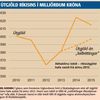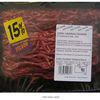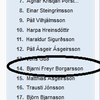Föstudagur, 20. janśar 2012
Įstandiš ķ Evrópu er aš batna.
"Velgengni Spįnverja viš sölu rķkisskuldabréfa ķ gęr kom greinendum ķ opna skjöldu. Aš sögn spęnska dagblašsins El Pais seldu Spįnverjar rķkisskuldabréf fyrir 6,6 milljarša evra en takmarkiš var aš selja fyrir 4 milljarša evra."
Žetta eru jįkvęšar fréttir frį Evrópu og sżnir aš įstandiš žar er aš skįna verulega. Spįnn er aš fį lęgri įvöxtunarkröfu žrįtt fyrir aš vera ein af žeim löndum sem standa hvaš verst ķ evrópu (svokallaš PIGS lönd)
Žessar fréttir koma frį Evrópouvaktinni sem er fréttamišill į móti ESB. Įrangurinn er žvķ aš öllum lķkingum mun betri.
hvells
Flokkur: Stjórnmįl og samfélag | Facebook

 ludvikjuliusson
ludvikjuliusson
 arinol
arinol
 smarg14
smarg14
 skagstrendingur
skagstrendingur
 bofs
bofs
 alit
alit
 maeglika
maeglika
 helgigunnars
helgigunnars
 kliddi
kliddi
 ingagm
ingagm
 rabelai
rabelai
 linublogg
linublogg
 seinars
seinars
 svei
svei





Athugasemdir
LONDON: Italian and Spanish bond yields were stable on Monday, with traders citing ECB bond purchases offsetting pressure triggered by a Standard & Poor's euro zone downgrade salvo and rising risk of an unruly Greek default.
S&P downgraded on Friday the ratings of Italy, Spain, Portugal and Cyprus by two notches and those of France, Austria, Malta, Slovakia and Slovenia by one notch each. Germany's triple-A rating remained intact.
The downgrades were broadly expected and German Bund futures consolidated after hitting a record high of 140.23 on Friday. But strategists and traders said the contracts could still reach new peaks as investors were reminded of the fragility of the euro zone's anti-crisis tools.
Analysts say the downgrades will almost certainly lead to a cut in the EFSF euro zone bailout fund's rating as it would be politically difficult for the still top-rated Germany or Finland to make up for France's guarantees to the fund.
"I can't see any situation in which the EFSF doesn't get downgraded," Rabobank rate strategist Lyn Graham-Taylor said.
"Once the EFSF is downgraded it will be another risk-off move which will probably affect particularly Spain and Italy. We all knew it was too small ... but it has become even less of a credible rescue mechanism."
Italian two-year yields were down 4.6 basis points on the day at 4.378 percent, having opened at around 4.6 percent. Ten-year yields were up a shade at 6.7 percent in Italy and at 5.25 percent in Spain.
Traders said the European Central Bank was seen buying Italian and Spanish debt in the 3-10-year tenors.
"If it wasn't for the ECB aggressively buying bonds the periphery would be where it was earlier," a trader said. "The ECB is the only buyer today."
The equivalent French and EFSF spreads over Germany were little changed, but in credit default swaps markets, the cost of insuring Italian, Spanish, French, Austrian and Belgian debt against default rose.
GREECE AGAIN
In another blow to confidence in the currency union's chances of muddling through the crisis, talks on a debt swap by private creditors seen as crucial to avoid an unruly Greek default broke up without agreement in Athens on Friday.
A Greek default could lead to a break-up of the euro zone and may trigger a deep recession within the bloc.
Graham-Taylor expected the Greek worries to send peripheral spreads wider in the near-term, while Rabobank's favourite trade, a Dutch/French spread widening, could "easily" have some 20 basis points more to go from about 100 bps.
"I can see some convergence between Spain and Italy, the Greek talks are not looking hugely positive."
Bund futures were last 14 ticks lower at 139.80, having hit a record high of 140.23 on Friday. Ten-year German cash yields were little changed at 1.78 percent.
Momentum indicators such as the MACD (moving average convergence divergence) suggested Bund futures were likely to move further up into uncharted territory in the next few weeks, UBS technical analyst Richard Adcock said.
The 138 percent Fibonacci extension at 142.26 is the next target beyond the current record high, Adcock added.
"Technically, Bunds still look quite attractive, but yields are very low now," said Nick Stamenkovic, bond strategist at RIA Capital Markets.
"We need a deterioration in the situation in euro land or we need to see signs that the global economy is heading into recession for yields to break below 1.70 and I don't think we're going to get that this week."
Copyright Reuters, 2012Jan. 16 (Bloomberg) -- The European Central Bank bought Italian and Spanish government bonds, according to three people with knowledge of the transactions, who declined to be identified because the deals are confidential.
Nobody at the press office of the ECB in Frankfurt was immediately available for comment when contacted by Bloomberg.
To contact the reporter on this story: Keith Jenkins in London at kjenkins3@bloomberg.net
To contact the editor responsible for this story: Daniel Tilles at dtilles@bloomberg.net
Žetta heitir aš pissa ķ skóinn sinn.
Ef žaš kallast góšar fréttir aš Evrópa sé aš pissa ķ skóinn sinn hvernig eru žį slęmu fréttirnar :)
Eggert Sigurbergsson, 20.1.2012 kl. 12:56
ég er ekki aš segja aš allt sé ķ stakasta lagi.
vandręšin eru til stašar en svo betur fer er įstandiš betra meš degi hverjum.
žvķ ber almenningi į ķslandi aš fagna einnig vegna žess aš slęm evrópu hefur neikvęš įhrif į lķfskjör hér į Ķslandi.
į botninum er best aš spirna. og žaš į viš ķ evrópu einsog annarstašar.
hvells
Sleggjan og Hvellurinn, 20.1.2012 kl. 13:21
Sęll.
Žó tķmabundiš gangi vel aš selja skuldabréf breytir žaš litlu um hiš óumflżjanlega. Atvinnuleysi er enn afar hįtt į Spįni. Hlutirnir er fjarri žvķ ķ lagi žar, žvķ mišur.
Helgi (IP-tala skrįš) 20.1.2012 kl. 17:32
Žetta eru jįkvęš teikn. Žaš er bara žannig.
Atvinnuleysi enn hįtt?? Var žaš ekki hįtt ķ bullandi góšęri?
Ekki góšur efnahagslegur męlikvarši į evrópu.
hvells
Sleggjan og Hvellurinn, 20.1.2012 kl. 21:06
Bęta viš athugasemd [Innskrįning]
Ekki er lengur hęgt aš skrifa athugasemdir viš fęrsluna, žar sem tķmamörk į athugasemdir eru lišin.